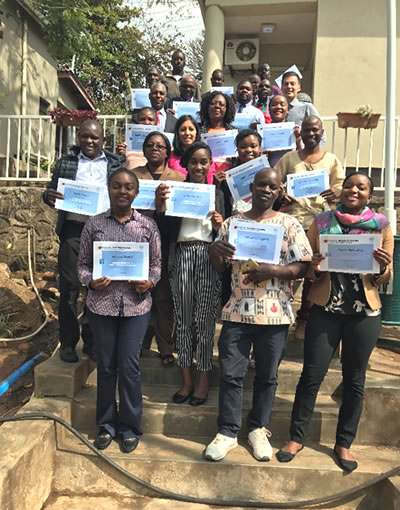Since the World Trade Organization (WTO) Trade Facilitation Agreement (TFA) entered into force, WTO members should have functional National Trade Facilitation Committees (NTFCs) in place. Although NTFCs’ role is rather simplistically defined under the TFA as “to facilitate both domestic coordination and implementation” of the Agreement, in practical terms, their functions are often much broader.
WTO members are increasingly relying on NTFCs and expanded the scope of their mandate to develop and plan trade facilitation reforms to reduce time and cost of trading across borders, to conduct consultations and foster public-private dialogue, and to provide policy guidance to national authorities. Many national committees have also undertaken regional and international activities, through cooperation with regional committees, by participating in regional meetings and contributing to regional initiatives, amongst others.
Based on these developments, monitoring and evaluating (M&E) the implementation of trade facilitation reforms has become a critical function of NTFCs.
Monitoring and evaluation in the context of trade facilitation
Monitoring is essential for NTFCs to ensure that the trade facilitation work is going in the right direction compared to initial plans. As the key trade facilitation coordination body, NTFCs need to constantly monitor the advancement of trade facilitation activities to reach cross-border trade time and cost reduction goals.
Evaluation tools and methods help NTFCs to assess the progress made, either during the implementation phase (mid-term evaluation), or after the completion of a project (final evaluation). Evaluations allow to identify what worked well (good practices) and what should be done differently in the future (lessons learnt).
From the perspective of donor countries, monitoring and evaluation are critical components in the project design and implementation, especially for large multi-million-dollar scale projects. Project managers report regularly to fund providers, who require constant monitoring to collect relevant and up-to-date data. Depending on the project scale, a mid-term and a final evaluation can be necessary.
For all these reasons, many NTFCs have expressed the need to get introduced to M&E tools and build their capacities for monitoring and evaluating trade facilitation reforms. This is very much reflected in formal and informal discussions with our partners in the field. During the first African Forum for NTFCs in 2018, UNCTAD conducted consultations with Empowerment Programme beneficiaries on their needs for future assistance. Results show that the vast majority (71%) of respondents expressed the need for specific training on how their NTFC could monitor and evaluate the implementation of the WTO TFA.[1]
New Empowerment Programme Module on M&E
Adopting a demand-driven approach, UNCTAD decided to strengthen its trade facilitation technical assistance offer by designing a new special training module dedicated to monitoring and evaluation. This special module will be offered to all UNCTAD partner countries participating in the Empowerment Programme for NTFCs.
This special module on “Monitoring and Evaluating Trade Facilitation” included the following learning objectives. By the end of the workshop, participants must be able to:
- Distinguish the concepts of “monitoring” and “evaluation” and describe their role in the context of trade facilitation projects;
- Explain the key elements of the result-based management (RBM) process, including planning, implementing, monitoring, and evaluating, as well as the main benefits of using the RBM approach to management;
- Popularize M&E basic notions, such as a “problem tree,” the “theory of change,” and “result chains” for other NTFC members;
- Apply the knowledge acquired by developing results chains for the NTFC’s trade facilitation activities, with related inputs, outputs, outcomes, and impact;
- Design a plan to monitor and evaluate a National Trade Facilitation Roadmap, with specific deadlines, performance indicators, and schedule of activities.
First pilot workshop conducted in Malawi
A pilot training workshop was delivered in Blantyre, Malawi on 15-18 July 2019 with the Malawi NTFC. The participants were provided with an overview of monitoring and evaluation tools and approaches, such as the results-based management (RBM) and performance measurement. The workshop built upon previous work done by Malawi NTFC, which had developed a National Trade Facilitation Action Plan (NTF-AP) with the technical support of the World Bank. The objective was to prepare a “Monitoring and Evaluation Plan,” with a clear role for the Malawi NTFC in the NTF-AP implementation.
Adopting a participatory approach, the workshop fostered the involvement of NTFC members by using practical and group exercises based on the Malawi NTF-AP. Participants provided inputs for developing a Monitoring and Evaluation Plan through group exercises and discussions. For each NTF-AP activity, participants decided on the role that the NTFC must play by a specific deadline. They also prepared a result chain for selected activities, and classified them into either quick wins, medium term, and long term. “Learning by doing” has proved to be a successful approach in Malawi.
UNCTAD can offer this new module on Monitoring and Evaluation to any partner country expressing interest in this technical assistance.
The next workshop on “Monitoring and Evaluating Trade Facilitation” will soon be delivered in Lobamba, Eswatini on 17-19 September 2019.
[1] Consultations conducted in November 2018 through focus group with 28 representatives of UNCTAD Empowerment Programme beneficiary countries.



